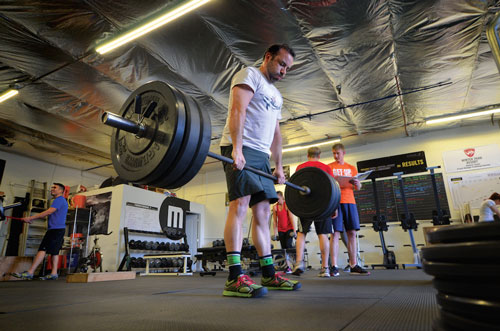Nearly everyone focuses on the details and misses the bigger picture when it comes to performance and health. This happens for a few reasons.
1: Media
Fitness magazines would have you believe the most important thing in the world is the ratio of bananas to leafy green vegetables in your diet or the specific arm workout combo you do each day. Forget the basics like getting quality sleep, managing sleep or not going on a bender a few nights per week. It must be the orange that you ate two weeks ago that stymied all progress.
2: Human nature
There are many biases as work in this situation but the most fundamental one is that we focus on what we can control and ignore what we don’t understand or don’t want to confront. Everyone knows they need more sleep, to eat more veggies, and to manage their stress more effectively but it’s way easier to focus on eating one less banana each week or adding more “ab” work to their workout than it is to confront much bigger lifestyle behaviors. “Big” changes such as changing sleep habits or nutrition behaviors will require some serious work and commitment to change.
Everyone (even us, the coaches) fall prey to this. You don’t need to feel bad for obsessing over the details. It’s actually a good sign – if you didn’t care about making some changes you wouldn’t take the time to focus on trivial details.
Every time I think I “need” to make any change or want a client to make a change I ask myself the following question:
Is the change I want to make my limiting factor right now?
If yes, dive in. If no, take a step back and look at the bigger picture.
A short story
Here is a good example of this in action. I’ve been working with a male client in his 50’s for a while; we’ll call him Bob.
Here is Bob’s lifestyle:
- High stress job
- High family demands – married with kids
- Sleeping 4-6 hours per night
- Drinking 4-5+ nights of the week (2-4 drinks)
- Eating dessert 3-4x per week
- Eating cliff bars as meals or just doesn’t eat for long stretches during the day
What Bob had going for him when he started:
- Consistent with exercise
- Breakfast and dinner is solid
- Good support system
- Ready, willing, and able to make changes
What Bob wanted to do when he started:
- Exercise more because he wasn’t seeing results
- Replace easy workouts with hard ones; because hard = effective
- “Clean up his diet” by cutting out specific things like fruit, gluten, etc
What we worked on after talking through the need to balance stress and focus on the big picture:
- Eating consistently throughout the day
- Reduced cravings and “need” for alcohol or sweets
- Sleep quantity
- More energy, easier to make good food choices, more productive, recovered faster from workouts
- Slowly improving food quality
Bob still has improvements to make but he’s no longer on the treadmill of ups and downs. He focuses on consistent small changes and which leads to small, but consistent improvements in every aspect of his life. This wasn’t an overnight process. Bob has a busy life full of demands and changing everything overnight was not feasible. Bob dedicated himself to making lifestyle changes, not short-term unsustainable changes and it made all the difference in the world for him.
